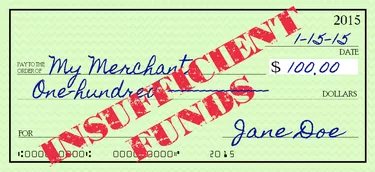
Non-sufficient funds checks are checks that banks refuse to negotiate because there are not sufficient funds in the check writer's account to cover the check at the time of presentment. Banks stamp "NSF" on these checks and return the items to the bank that accepted the check for deposit. Both the customer depositing the check and the check writer have to pay penalty fees.
Non-Sufficient Funds Fees
Video of the Day
An account holder who writes checks that are rejected due to non-sufficient funds has to pay a penalty fee that often amounts to more than $30. If you write several NSF checks, you must pay a separate NSF fee for each one since penalty fees are assessed on a per-item basis. These fees could cause your bank account to go into the negative, in which case you may have to pay additional fees for having a negative balance. In some states, including Texas, the bank refusing to honor the item must return it to the bank requesting payment within 24 hours.
Video of the Day
Redepositing Checks
Banks normally present checks twice before returning the actual check back to the account holder who actually deposited it. The second presentment of the check normally occurs on the business day immediately following the day the item was first presented. If funds are still unavailable, the bank sends the check back to the depositor. The bank that accepted the check for deposit charges the depositor a "return item" or "chargeback" processing fee. Banks charge this fee because legally account holders assume responsibility for all items that they deposit, even if those items are third-party checks.
Frozen Account
In some instances a bank can freeze your account due to an NSF check. Some NSF checks are actually fraudulent checks that are presented for payment against your account. If a bank suspects that people are attempting to negotiate fake checks on your account then the bank can freeze the account. If you deposit a third-party NSF check, your bank may freeze your account if your bank believes you received the check from a fraudster who may have compromised your account. When banks suspect fraud, the accounts in question are normally closed and remaining funds are transferred to new accounts.
Considerations
In 2010, federal laws took effect that limited the ability of banks to charge NSFs in connection with non-recurring debit card purchases. However, the new laws do not prevent banks from assessing either NSFs or return item fees in connection with bounced checks. Furthermore, neither federal nor state laws limit the amount that a bank can charge you as a penalty fee for writing an NSF check.